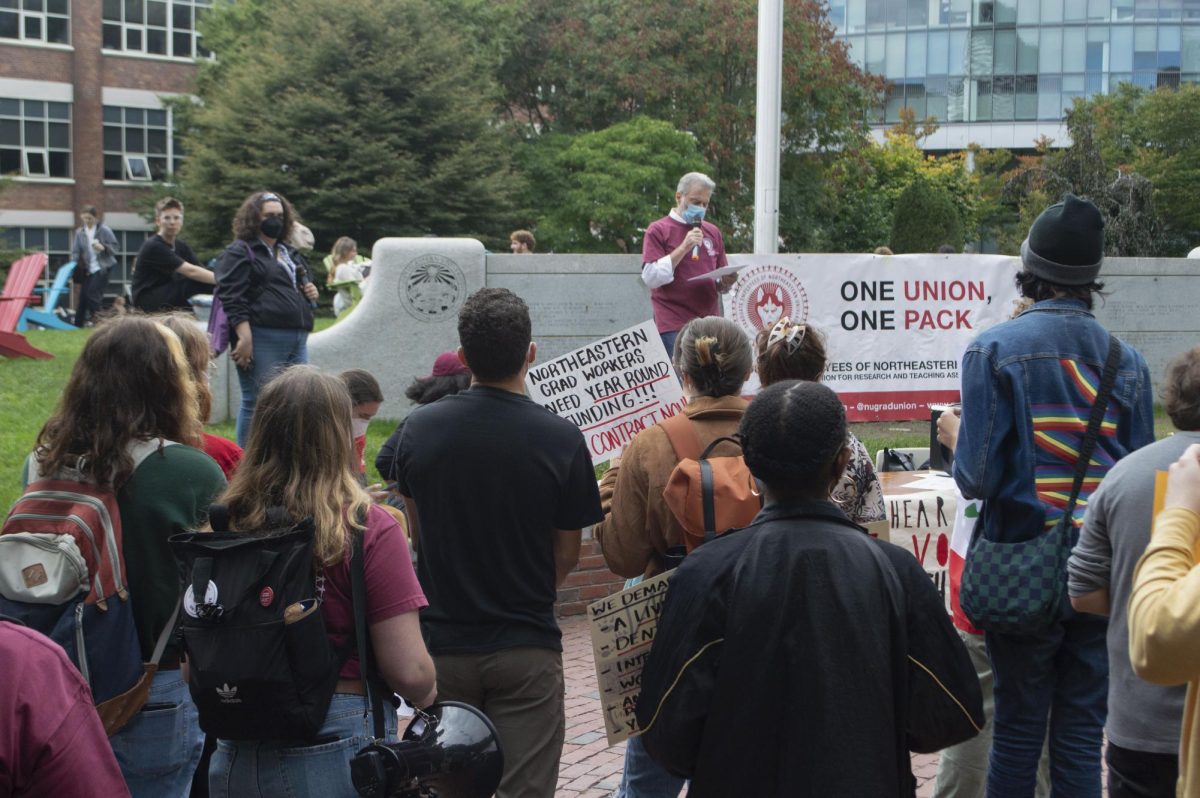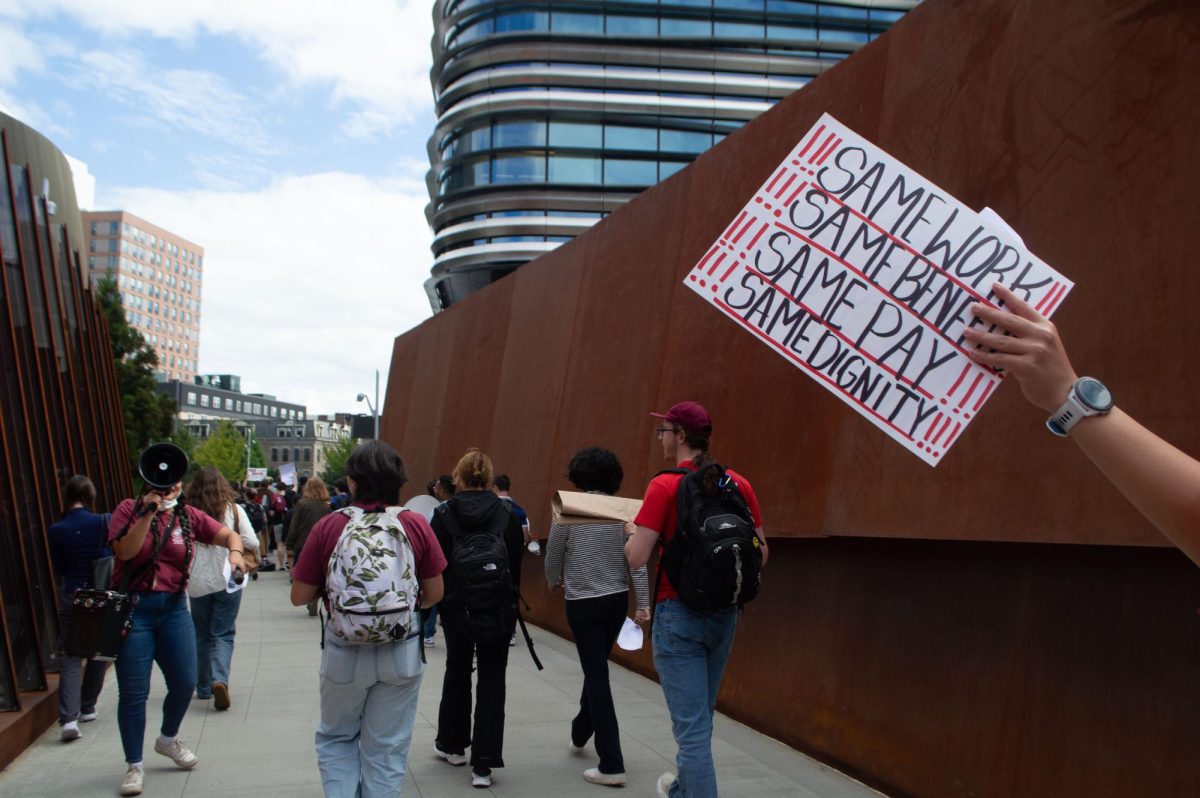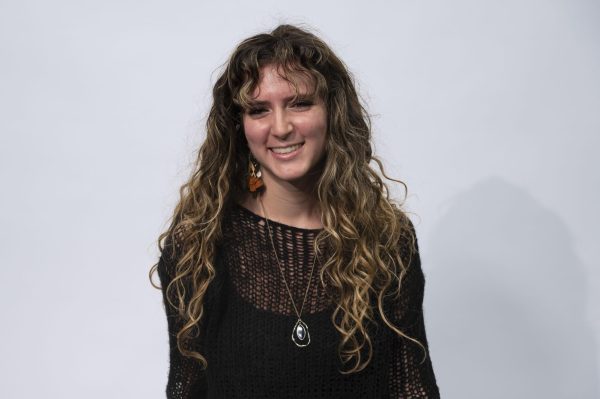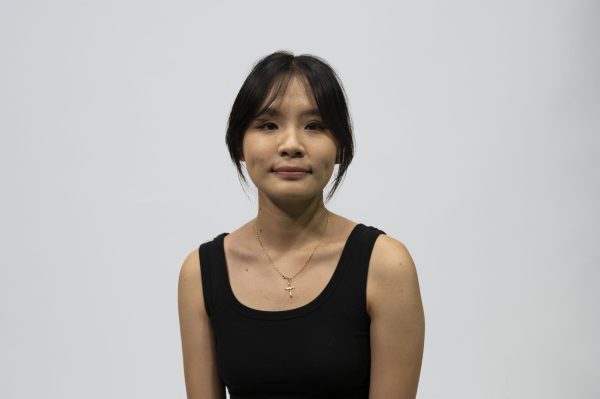Members of the Graduate Employees of Northeastern University rallied on Centennial Common Oct. 2 to mark the one-year anniversary of their union election and 10 months since contract negotiations began. About 100 demonstrators were in attendance throughout the rally, organizing committee member for the union Shahinaz Geneid told The News.
The graduate student union, part of the United Auto Workers union and known as GENU-UAW, was established at Northeastern in 2015 and currently represents approximately 3,000 graduate workers. The union was certified to begin bargaining with the university following a landslide vote in favor of union certification in September 2023, when 94% of voting graduate workers elected to certify themselves as a bargaining unit. Since then, the bargaining committee has met 13 times with the university, according to Niki Thomas, a doctoral candidate in bioengineering and member of the union’s nine-person bargaining committee.
“The university is getting familiar with the things that we want, and we’re getting familiar with what the university is willing to give,” Thomas said. “And it ended up being on total opposite spectrums.”
Karl Klare, a Northeastern School of Law professor and labor law scholar, delivered a speech on the union’s ongoing negotiation efforts. “Let me start with the bad news: [Northeastern’s] administration is trying to take you for a ride,” he said to the crowd. “They have no shame.”
However, Klare said, “GENU-UAW does not give up.”
When asked for comment about the union’s demands, a Northeastern spokesperson directed The News to the provost’s website detailing updates on the negotiations. The page states that the university had proposed “many of the provisions that are found in other graduate union contracts, including economic increases, time off, holidays and parental leave, as well as funds for medical and dental assistance for stipended PhDs, workplace safety, non-discrimination and anti-retaliation provisions, along with a comprehensive grievance process.”
“The University brought counterproposals to changes the Union proposed on ground rules, with no response from the Union. The Union then rejected the University’s proposed union contract and announced its intention to negotiate one provision at a time,” the update on a February bargaining session reads. The university said its last bargaining session with the union on Sept. 19 was “productive.”
One of the employees’ central demands in their contract negotiations is additional protections against being “overworked,” said Chloe Bennett, a doctoral student in population health and member of the bargaining committee. In a July 7 article proposal to the university, the union demanded the maximum workload for salaried graduate workers should not exceed 20 hours per week. An agreement about workload has not been reached yet.
The union is also working to secure protections for time off, writing in a July 16 bargaining update that while “some forms of paid leave already exist informally, we’d like to formalize these terms so they will not be taken away in the course of our contract.”
“We know there are some programs where people bring sleeping bags to their labs because they’re sleeping overnight,” Bennett said. “You shouldn’t be working more than 20 hours a week, and we’re asking to actually protect that contractually.”
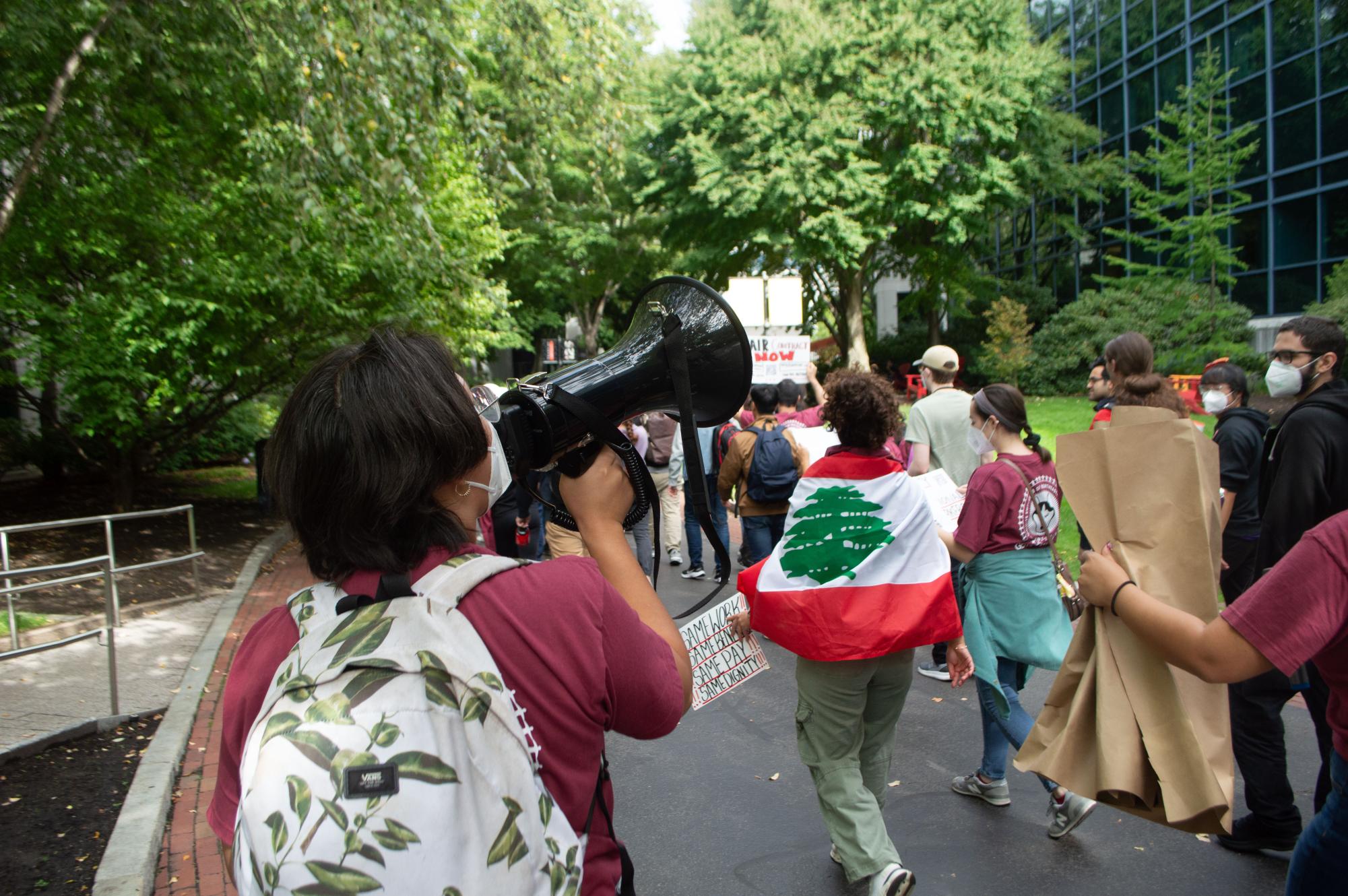
Another point of contention is compensation, especially for law school graduate workers. Currently, law school graduate workers’ pay is capped at $2,000 per semester due to work study restrictions the university places upon federal work study grants, said Sophia Sheng, a law school student and member of the bargaining committee, in a press release from December.
Bennett said she made $39,000 last year, which falls far below the average income of $49,000 for students at the nearby Massachusetts Institute of Technology. The union has proposed that all salaried graduate student workers receive a minimum annual wage of $60,000 after the university offered raises of at least 2.5% for most stipended and hourly workers.
“If the union agrees to the administration proposal, you will be worse off,” Klare said to the crowd.
The union is also working to secure protections for international graduate students, who account for 16,209 of all 24,078 graduate students at Northeastern.
“I’ve heard stories about our international grads having to wait way too long to get paperwork for their visas,” Thomas said. “There are ways the university functions that are not working for us.”
In negotiations, the union is asking for the university to begin providing necessary accommodations for international grad students to renew their visas.
“When we asked questions about the unreasonable timelines their proposals offered for leaves of absence related to visa renewal, the University reaffirmed their previous statement that international grads should just overstay their visas,” GENU-UAW said in a statement on its website regarding their most recent bargaining session with the university, which took place Sept. 19.
“[International students] are often asked to work harder and longer for the same degrees,” said Tim Rupprecht, a doctoral candidate in computer engineering. “They don’t get enough time off. If you’re from a country like Iran or China that’s far away, you might not see your family for years, and that’s just not fair; I see my family several times a year.”
After speeches from GENU-UAW members, as well as from other local unions, union members marched together from Centennial Common to the entrance of EXP, which houses Northeastern President Joseph E. Aoun’s office. Officers with the Northeastern University Police Department were stationed outside of EXP as members taped up copies of the union’s demands and banners stating the personal reasons that GENU-UAW members are asking for better working conditions.
“I was an undergrad at Northeastern. I’ve been here for nine years,” said Lisa Oakley, a doctoral candidate in computer science, who joined the union when she began her doctoral degree in 2020.
“I’ve seen so many times that without the power of all of us together, people can be left helpless when the university decides that they’re no longer useful to them for some reason,” she said. “I’m here today to keep pushing Northeastern to meet our reasonable demands … and give us the things that we’ve been asking for [for] eight-plus years and give us the protections and benefits that we deserve because we work really hard for this university.”
Editor’s note: This article was updated 4:00 p.m. Oct. 9 to correct the number of graduate student workers GENU-UAW represents from 1,200 to 3,000.
The Huntington News is dedicated to serving the Northeastern University community with original, professional reporting and creating an environment in which student journalists can learn from one another. Support an independent, free press at Northeastern University with your donation today.





